A Different Place – The Unsettling Moral Questions of Silent Hill 2

Would you kill a loved one?
What if they wanted you to? What if they were terminally ill and in pain? Or would you just leave them before they died, getting on with your own life rather than waste it watching your beloved wither?
MASSIVE SPOILERS FOR SILENT HILL 2 AHEAD
Silent Hill 2 sees us through the supernatural punishment of James Sunderland, a man who took his wife’s life, smothering her with a pillow as she lay dying of some unknown illness. It’s a shocking act that plays out in a staticky video near the game’s conclusion, bringing a sickening clarity to the monsters and visions he’s worked his way through over the course of the game.
This setup – a hellish horror game as a form of punishment for your innermost thoughts and most secret of sinister deeds – plays masterfully, weaving hidden meanings about James’ cruel deed into every bit of imagery, sound, environment, and gameplay. It’s one of the most memorable stories that I’ve ever experienced in this medium, showing an upsetting look at humanity at its most cowardly and selfish.
But is it that assessment of James’ actions that simple? I want to say that someone killing his wife with a pillow so he could move on with his life is an act of extreme violence, selfishness, and monstrosity. I feel safe in hating James for what he did, and for the lust and anger that drove him to this place (symbolized by the sexier version of his wife conjured by his imagination, Maria, and the embodiment of his own cruelty and need, Pyramid Head).
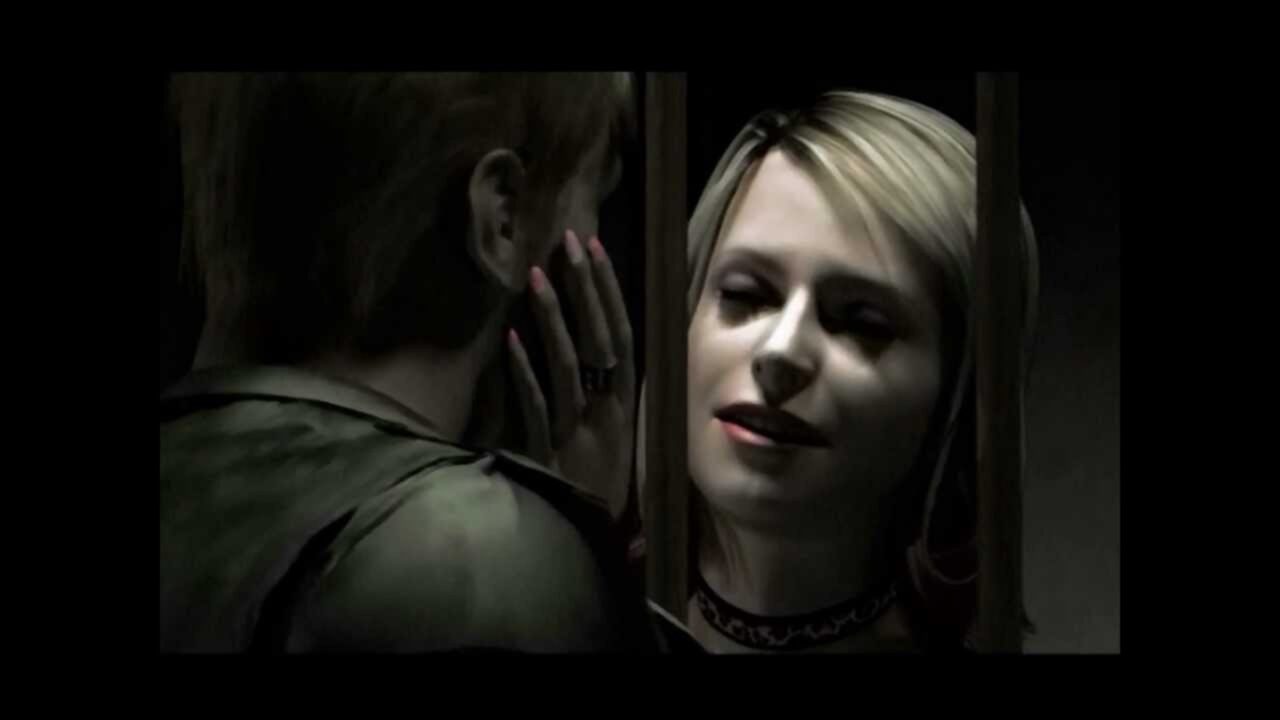
But doesn’t a teensy, tiny little voice in my head whisper to me: “Do you really know what that would feel like? What it would be like to watch a loved one decay and die? To wait for them to pass on over agonizing months and years, your life falling apart as you simply wait, hopelessly, for them to be gone?”
I’m not trying to say that James’ actions in killing his wife were not heartless, but that Silent Hill 2’s most compelling aspect is its willingness to make us ask ourselves these questions. It forced players to consider a sickening, cruel, and terrible possibility in their own lives. If they had a loved one dying of something incurable, would they stick around? See the illness through to its grim conclusion? What would they be willing to do if their loved one asked them to end it all? Could they do it?
The game asks these questions through its slow, torturous wandering through a realm created to make James suffer. It’s filled with beasts that have been bound and silenced, perhaps mimicking James’ feelings of being trapped and lashing out in violence (or do their muffled, bound shapes hint at the suffocation that his wife, Mary, suffered?). Curvaceous nurses lash out at James with steel pipes, both alluring and enraged (their faces also bound and sealed, like Mary’s own). Its monsters are trapped, flailing, agonizing things, seeming to only hurt James as they twist and shake through their own suffering. Besides, James’ injuries from them are nothing a convenient First Aid Kit or Energy Drink won’t fix, right? And what does this inconvenient, easily-solvable pain say about James’s suffering in comparison to Mary’s?
We encounter these creatures as we walk through foggy streets – a world clouded by uncertainty in what the future leads. We walk through broken apartment homes and stained hospitals. We meander through a decayed, burned hotel that once held so much happiness. These places scream at the player about the ruin James’ actions have brought to them through his actions, showing a world made empty save for his pain – a world of his own design because of what he chose to do.
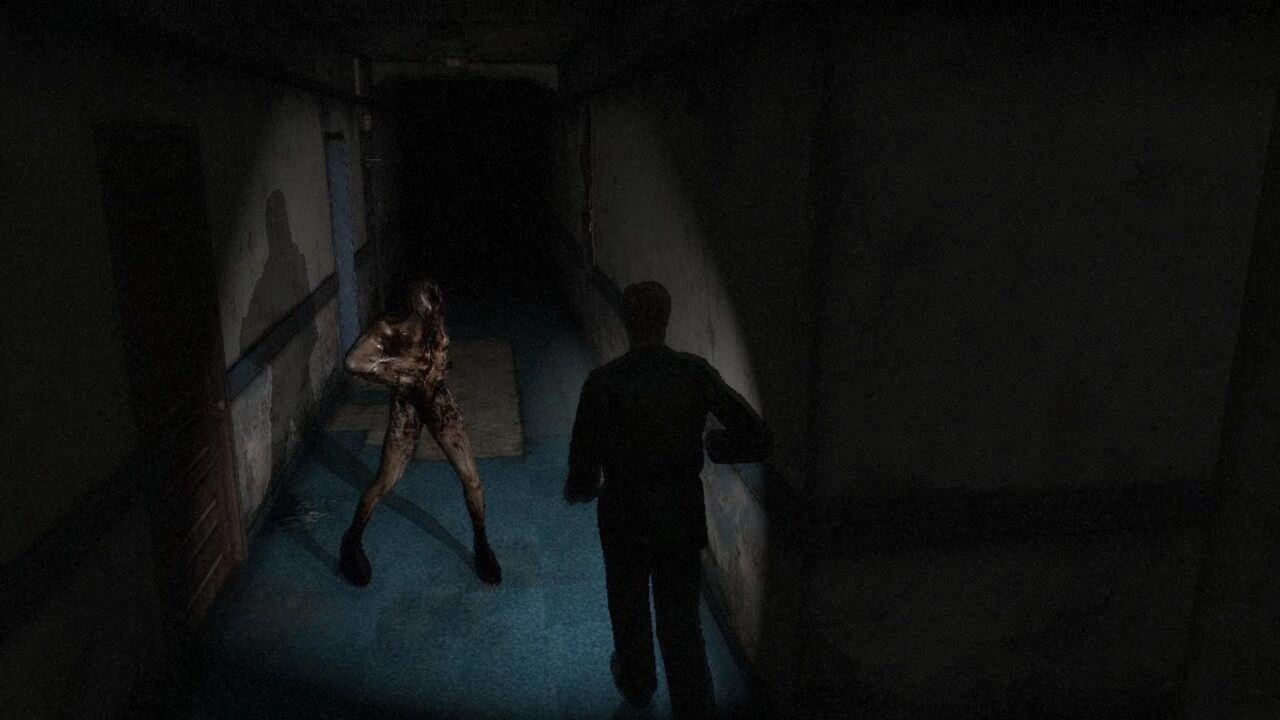
Silent Hill 2 isn’t shy in its condemnation of James’ actions, but it does so slowly, allowing the player time to think as they explore and take in the meaning of this supernatural realm. Monsters and puzzles are spread far apart, giving the player plenty of time to think about what they’re looking at. There’s space to consider why Laura, the spunky child troublemaker, continually gives James a hard time for what we initially feel is “no reason.” We have time to think about why Eddie, a deeply-unsettled man in child’s clothes, brings us so much discomfort, or what has drawn Angela, a woman shrouded in gray and seemingly seeing a different reality than us, to this realm. What binds all of these beings and torments together?
Horror games often have this kind of pacing, allowing the player time to absorb the environments and have their imaginations concoct twisted new visions to terrify them. This allows the atmosphere to do its work in creating fear within us, and while Silent Hill 2 also does this for the same reason, it also does so to give us time to think. We’re allowed to consider what all of this means as we walk the streets, a chilled fog billowing endlessly around us. This fog calls up many a lonely walk, in my mind, even if we’re rarely ever actually alone in this town.
But these things all happen BEFORE we know the full extent of James’ actions, don’t they? We only learn what James has done near the game’s end. Still, the game, with its strange sets of monsters and locales, hints strongly at something being terribly wrong with James long before it’s due to end. Again, look at its antagonists. The monsters seem strangely pathetic in a genre that is often filled with capable killers and razor-toothed beasts, but Silent Hill 2’s foes seem weak and helpless in their attacks. Bashing them over the head with a pipe or shooting them seems almost cruel, to an extent. You’re given the impression that James might not be a great person through his actions to defeat them.
And what about when James abandons Maria in the winding corridors with Pyramid Head? James has seen what Pyramid Head will do to people, and yet he (with you, as the player, guiding his flight) turns and runs, careless to check on Maria to see how far behind she is. I mean, James makes a halfhearted attempt to stop the elevator by hitting the buttons, but does he really work that hard to stop the doors from closing so he can save Maria? You could argue that he’s trying, but something about this scene always bugged me. I always thoughts he could have been trying harder, and that his actions were more to keep up appearances, if only to himself, that he was a good person trying to save Maria, even if he wasn’t really trying very hard. Deep down, I wondered if he wanted her to just go away as well.
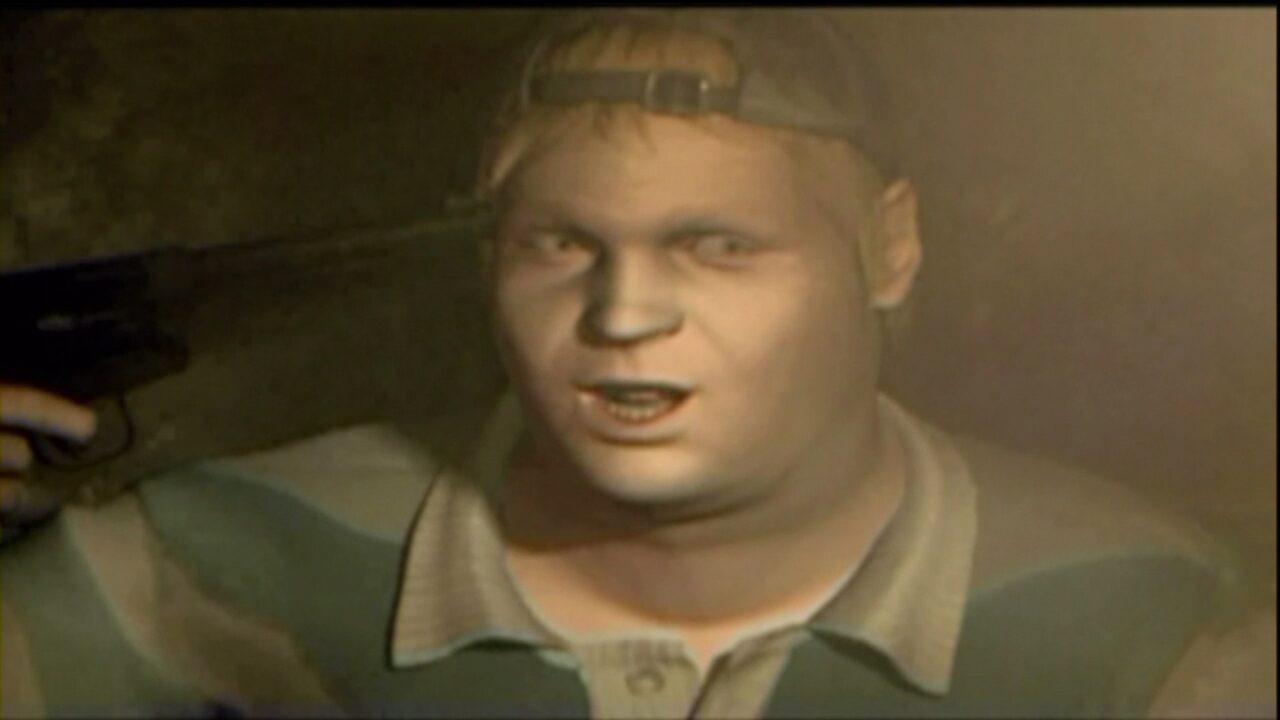
The people he meets imply something is wrong here as well. Eddie seems to be antagonized by outside forces, as does Angela. James’ conversations with them throughout Silent Hill 2 seem to hint that they’re both being tormented by something James can’t see, which, during my initial run, made me wonder if James himself was being threatened by something that had manifested for him alone. Eddie suffers for crimes he felt he’d been pushed to, but Angela is in a form of self-inflicted pain as a victim of abuse. Both suffer for different reasons, hinting at Eddie being deserving and Angela not, but that both do suffer from something horrible in their lives. So, what horrible thing could lie in James’ life and his search for his dead wife? I was not expecting the extent of his actions, but through these hints, I knew that something vile was coming.
So, even on this initial run, the game has us mulling over the meaning of this place, as well as the meaning behind your appearance here. And in this, we see some of the moral questions the game asks us. Would we use lethal force to keep ourselves safe from a creature that meant us harm, even though we could normally just move sneak them? When is it appropriate to kill something that wants to hurt us? We’re given time to think on these things as we explore and beat nigh-helpless creatures into a pulp in the dirty streets.
Eddie’s actions deepen this question, asking us how far we could be pushed before we struck back with lethal force of our own. What is our breaking point? And what would we be willing to do when we got there?
In Angela, we see someone pushed to that same level of violence, but for her, it was self-preservation (in my eyes). She still suffers guilt over what she did to her abuser, and self-loathing over allowing herself to be abused – so much so that she burns eternally over it. What would we do to help someone suffering so much? How would we endure in our day-to-day life after such an act? After such a life? What do we do in our own lives to stop abuse and help those abused?
Horror asks questions like this often. With its terrifying beasts stalking us, its supernatural afflictions and punishments coming down on our heads, and its unflinching glimpse at our cruelty and misery, it asks us how we would cope with the most terrible possibilities in our lives. It forces us to look at the things we’d all rather turn away from, demanding that we see our race and its monstrous people in a light that is both impossible and frighteningly ordinary. Some of the most effective horror explores things that can easily be real, but while it terrorizes, it also asks us to examine how these things come about and how we would be willing to act.
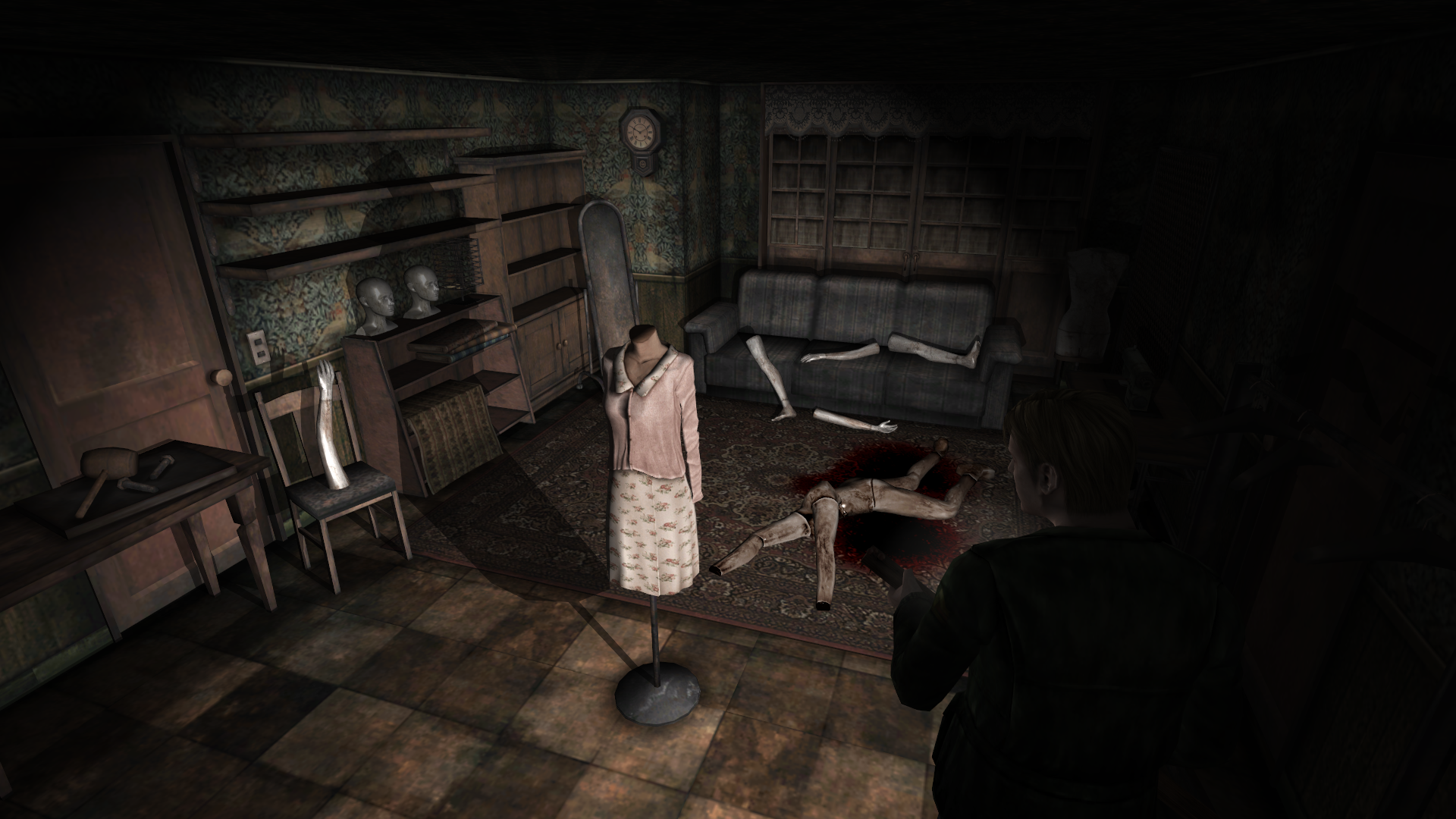
Silent Hill 2 asks this question with a brutality that is rarely matched in horror games, let alone games in general. And, like the endless downward spiral of its protagonist, it cuts deeper and deeper on repeat playthroughs. For, once we know why James was sent here, we can fully appreciate the things he witnesses in his torments, and consider the awful questions of what he experienced and did to bring himself here.
Which brings us to those hard questions that we feel we know the answers to. Would we be able to kill a loved one? Would we WANT to kill them to free ourselves of them? They’re questions few of us will ever face, thankfully, but if we did, would we be as courageous as we think we would be? Would we be able to help a loved one with that sacrifice? Could you do it? Could you kill them, if they asked?
Would you kill them to be free of them? Or would you just leave them to suffer alone, moving on with your life? You may say you’d stay, but do you really know until you’ve been in that situation? When you are trapped watching your life fall to pieces, your only existence spent taking in every moment of your beloved’s suffering and deterioration? Could you watch them slowly die over years? Could you stay strong the whole time?
I want to say that I know what I would do, but I’ve seen people walk away from their terminally-ill spouses. I’ve seen family vilify them for it, and even judged them myself, but could I even begin to understand what they’re going through? Am I someone worthy of judging something facing some of the worst cruelty this existence has to offer? Would I be so different were I in their shoes? I want to say that I know what I would do, but there’s no way I could actually know until I faced that doom.
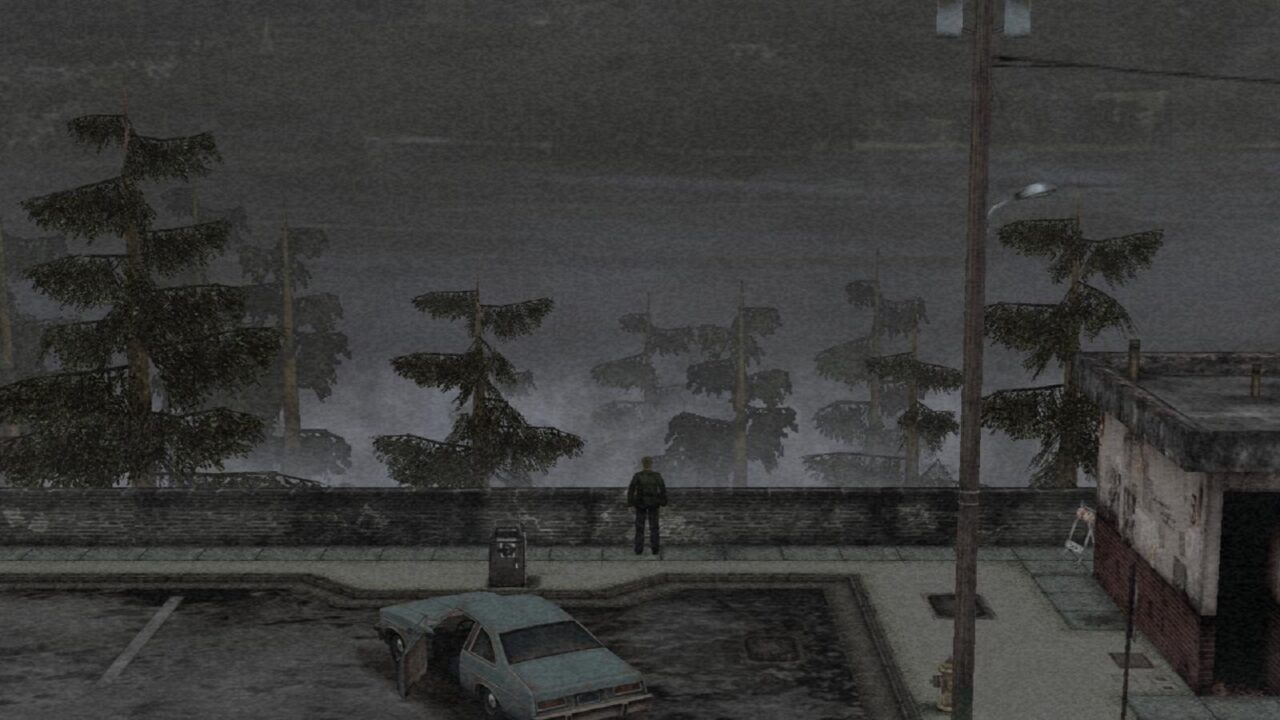
That idea frightens me so much, and is at the core of Silent Hill 2. For it is a game that makes you face the ‘good’ person you think you are and really, really ask yourself if that’s who you would be, deep down. It tells you that it is easy to assume you’d make the right choice in these situations, or that you’d have any idea what to do. It opens a door in your mind to some questions that leave me shaken to my core, forcing me to question who I really am, and leaving me terrified of the answer I might find should these events come to pass.
My heart tells me I would be strong. That I would hold on and support my loved one, no matter what they needed. But Silent Hill 2 asks us to wonder if we’re correct in those assumptions, reminding us that we have no idea what that suffering would feel like unless we had to endure it ourselves. That we cannot possibly fathom the depths of our self when life comes calling with the most reprehensible of conclusions.
This is why Silent Hill 2 was unforgettable, to me. It pried open a section of my mind and asked me to really, really look at myself and what kind of person I thought I would be. When it did, it showed me that I could never, ever be as certain as I wanted to be, and that there is a very frightening possibility that I am just as monstrous as the people I want to easily condemn. It makes you see that your certainty in who you are isn’t as solid as you may have thought it was, and while I feel we are right to condemn these actions, can we ever be sure we wouldn’t be guilty of them ourselves?
Silent Hill 2 asks us to examine ourselves, but to do so without being so sure of the answers we come to. To know that maybe, just maybe, we’re a terrible event away from finding ourselves in our own personal realm of torment and cruelty.
Categorized:Editorials

